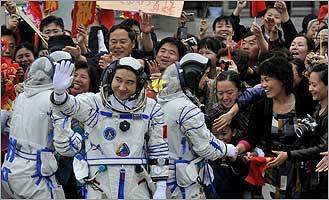China launches mission for first spacewalk

A Chinese soldier stands guard near the Shenzhou-7 manned spaceship, the Long-March II-F rocket, and the launch pad at the Jiuquan launch center in Jiuquan, China's northwest Gansu province, Saturday, Sept. 20, 2008. A Chinese astronaut will conduct the country's first spacewalk on Friday afternoon local time, state media reported. (AP Photo/Color China Photo)
JIUQUAN, China—China successfully launched a three-man crew into space Thursday to carry out the country's first spacewalk, beginning the nation's most challenging space mission since it first sent a person into space in 2003.
The Shenzhou 7 spacecraft, China's third manned mission, blasted off atop a Long March 2F rocket shortly after 9 a.m. EDT under clear night skies in northwestern China.
The spacewalk by one of the astronauts is expected to take place either on Friday or Saturday.
Underscoring the mission's heavy political overtones, Chinese President and Communist Party head Hu Jintao was shown live on state television hailing the astronauts at the launch site near the northwestern town of Jiuquan.
"You will definitely accomplish this glorious and sacred mission. The motherland and the people are looking forward to your triumphant return," Hu told the three, who were dressed in their flight suits and behind glass to avoid germs.
The mission is expected to last three to four days. The spacewalk will last about 40 minutes.
The spacewalk is expected to help China master the technology for docking two orbiters to create China's first orbiting space station in the next few years.
The spacewalk could happen either Friday or Saturday depending on how well the astronauts adapt to weightlessness and other physical demands of their environment, according to the China Manned Space Engineering Office.
The astronauts would return to Earth soon after the spacewalk, the office said.
The two astronauts who don spacesuits for the Shengzhou 7 spacewalk will be supported by Russian experts throughout the mission. Only one will actually leave the orbiter module to retrieve scientific experiments placed outside.
One of the astronauts will wear China's homemade Feitian suit, while the other will wear a Russian-made suit.
Fighter pilot Zhai Zhigang, an unsuccessful candidate for the previous two manned missions, has been touted by the official Xinhua News Agency as the leading astronaut to carry out the spacewalk.
Zhai and fellow astronauts and fighter pilots Jing Haipeng and Liu Boming -- all age 42 -- were introduced to journalists at a news conference late Wednesday.
A decade of training together ensured effective, smooth cooperation between the three, Liu said.
"The Shenzhou 7 mission marks a historic breakthrough in China's manned space program," Zhai said. "It is a great honor for all three of us to fly the mission, and we are fully prepared for the challenge."
Before the launch, Chinese Officials again expressed a desire for closer cooperation with other nations in space. But some nations, especially the United States, remain dubious of the Chinese program's military backing and are keeping Beijing at arms-length on projects such as the international space station.
"The U.S. concern is that cooperation with China could lead to a sharing of technology and expertise that could improve Chinese space and missile capabilities, which also could have military utility," the Union of Concerned Scientists, a U.S.-based group that researches the Chinese space program, said in a report issued Tuesday.
China, meanwhile, sees such restrictions as excessive and believes the U.S. aim is to "slow the pace of China's overall economic and technical progress," the group said.
China has a limited partnership with the European Space Agency on the Galileo navigation satellite network to compete with the U.S. Global Positioning System. Chinese space program officials point to such programs as signs of growing international involvement.
"International cooperation is an inevitable trend in manned space flights, which are large-scale projects with complex technologies and huge investment," Chen Shanguang, director of the China Astronaut Research and Training Center.
Chen was quoted by the official Xinhua News Agency as saying China could soon begin training astronauts for other countries, a service now provided by Russia and the United States.
Dean Cheng, who tracks Chinese military and technology issues at the U.S. Center for Naval Analysis, says China is likely to "cherry pick" successful foreign know-how, such as the Russian space suit and spacewalk expertise.
But Cheng said he doesn't foresee cooperation in the near future along the lines of the 1975 Apollo-Soyuz mission that brought Cold War rivals the U.S. and former Soviet Union together in space.
"I would suspect the Chinese want to advance the state of their own space capabilities before they engage in a joint mission with the Russians, if only to underscore that they are an equal in space," Cheng said.
------
Associated Press writer Christopher Bodeen in Beijing contributed to this report.






0 comments:
Post a Comment